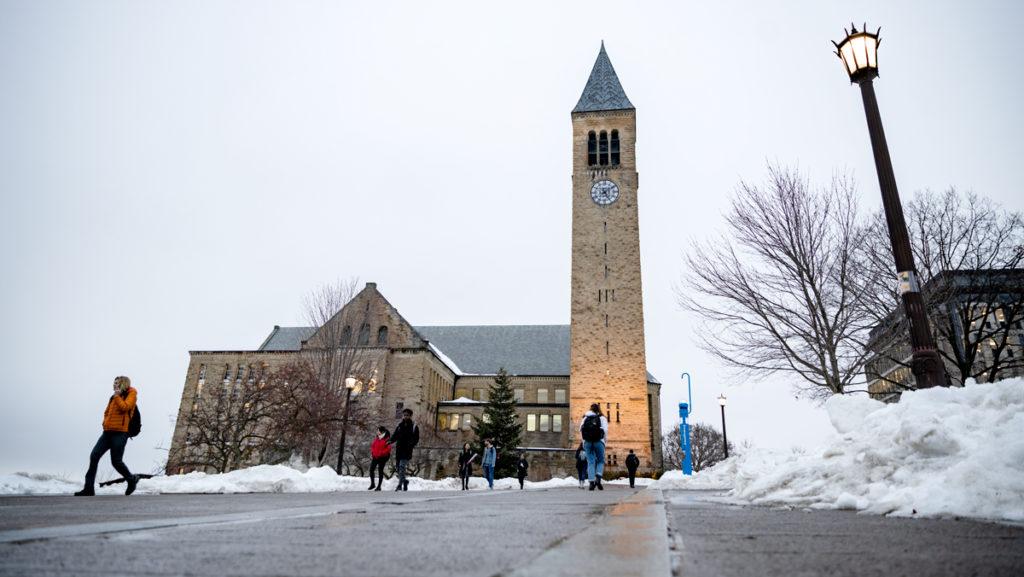Local police determined that Nov. 7 a bomb threat at Cornell University was not credible. Cornell University community members were told to avoid central campus and evacuate multiple buildings for five hours during the afternoon of Nov. 7.
At 2:12 p.m. Nov. 7, Cornell University sent an alert to its campus community telling members of the campus community to avoid central campus and evacuate the Law School, Goldwin Smith, Upson Hall and Kennedy Hall. A total of seven alerts were sent to members of the Cornell campus community. However, it was not until the fourth alert that the university announced that there was a bomb threat. As of Nov. 9, police have not determined who called–in the bomb threat.
Joel Malina, vice president for University Relations at Cornell University, sent an email to the Cornell campus community Nov. 7 after police had found no credible threats on the Ithaca campus. He said Tompkins County 911 received an anonymous call before 2 p.m. from an individual who claimed to have placed bombs in multiple academic buildings and was in another building with automatic weapons. As of 5:35 p.m. Nov. 7, the Cornell University Police Department (CUPD) and local law enforcement were still sweeping buildings on campus; the campus was cleared just after 7 p.m.
“We are relieved to report that this threat appears to have been a hoax,” Malina said in the email. “A cruel hoax; but, thankfully, just a hoax. The university has now resumed its normal operations.”
In the email, Malina said there were multiple law enforcement agencies that responded to Cornell’s campus, including the CUPD, the Ithaca Police Department, the Tompkins County Sheriff’s Office, Cortland Police Department, SUNY Cortland Police, the Federal Bureau of Investigation (FBI) and the New York State Police. He said Bang’s Ambulance, Cornell Emergency Services and the Ithaca Fire Department also responded.
Making a hoax threat of any kind is classified as a federal crime, according to the FBI. Individuals who make these threats can receive up to five years in prison along with local or state charges.
Dave Maley, director of Public Relations for Ithaca College, said that the Ithaca College Office of Public Safety was in contact with local law enforcement and that the college was able to determine that the event was not a threat to the Ithaca College campus. The college did not send out any alerts to the campus community regarding the threat at Cornell. Maley said this is because the college considers situations individually and the general policy is not to alert the campus community when something is not a direct threat.
“Every situation is considered individually, and given a different set of circumstances — specific location, nature and durations of incident, for example — we would consider making a notification in some manner,” he said via email.
Ithaca College junior Katharine DiDona tweeted Nov. 7, “hey @IthacaCollege, we’re less than five miles from a place that has been on lockdown (for over an hour) due to bomb threats. why exactly haven’t y’all sent a notification to your students yet to avoid that part of town? why is it taking this long?”
DiDona said she heard about the threat at Cornell over Twitter, which she said made her wonder why she did not hear about the threat via communication from Ithaca College.
“I was nervous,” she said. “I didn’t know if I should be following certain protocols and I wasn’t sure what to do even though it wasn’t a direct threat on Ithaca.”
DiDona said she was disappointed that Ithaca College did not alert its students to the threat at Cornell. She said the town of Ithaca is a community that both colleges are a part of.
“If something is threatening our community, then Ithaca [College] should be on top of that and should be letting us know, even if it isn’t a direct threat on us that doesn’t mean we shouldn’t have that information accessible to us,” she said.
She said she also felt that social media had a negative impact on the situation and led to the spread of rumors and miscommunication.
Cornell University sophomore Alanna Moskowitz said she was in her dorm building with friends when the first alert was sent out. She said she lives in Cascadilla Hall, which is 0.3 miles from the Law School, where community members were told to evacuate from. She said she was not concerned at first and thought the alert from the university was a test. However, she said as people started texting her asking if she was OK, she began to become more worried.
Moskowitz said that while she thinks the university communicated what information it had, she wishes there were more frequent alerts.
“The first notification was at almost 2 p.m. I think, and they didn’t tell us it was because of a bomb until around 4 p.m., but everyone was already thinking that and spreading rumors,” she said. “I thought they could’ve told us sooner so misinformation wouldn’t spread.”
She said it felt very chaotic once Cornell alerted the campus community to evacuate and avoid those specific buildings and central campus. Moskowitz said she saw a lot of misinformation and speculation on social media. She said some of the rumors made her feel unsafe, especially a rumor that was spread stating there was an active shooter in Collegetown, near her dorm building.
“I was definitely way more stressed in the beginning and then at some point … Columbia [University] had gotten the same threats and they had dismissed them, so that kind of made me think that it probably wasn’t a valid threat here either,” she said.
Columbia University in New York City and Brown University in Providence, Rhode Island, also experienced bomb threats during the afternoon Nov. 7. Both universities were cleared later in the evening.
On Nov. 5, Yale University evacuated multiple buildings after a bomb threat was called in. The Yale Daily News reported that a person called the police non-emergency line midday to report that 40 bombs had been placed around the campus. The Yale campus later received an all-clear from the city by 6:36 p.m. Nov. 5. Additionally, the Miami University Police investigated a bomb threat reported in the afternoon Nov. 6. Multiple buildings were evacuated. Ohio University also received a bomb threat Nov. 6 that was found not credible.
Assistant Life and Culture Editor, Elijah de Castro, contributed reporting.









